Did you know over 80% of insurance agencies face slow manual processes? These issues can cause lost revenue and unhappy customers. An effective Insurance Policy Management System (IPMS) helps streamline policy management, improve customer service, and meet regulatory standards.
Looking ahead to 2024, insurance solutions are evolving, especially with advanced claims management software. This software changes how operations work. This article will show you the top 10 solutions for this year. It will help you make smart choices to increase your insurance business.
What is an Insurance Policy Management System
An Insurance Policy Management System is an insurance software solution that makes handling various tasks easier for insurance companies. This system is a full platform that simplifies policy management, claims processing, and customer relationship management. Its main goals are making things run smoothly, offering better customer service, and following rules.
IPMS functions help manage policy life cycles, track claims as they happen, and combine different data sources. This system gives a clear view of everything happening, helping with better decisions and improving analytics. This leads to better performance for the whole company.
Challenges of Traditional Insurance Policy Management
In the insurance world, traditional challenges often arise, affecting how things work. One big problem is the heavy use of manual processes, which increases workloads and the likelihood of mistakes.
Old-fashioned methods make tasks like entering data and managing policies harder and more error-prone. Insurers using outdated ways find these tasks more tedious and open to mistakes.
But the problems don't stop at handling data. Slow claim processing can upset customers, leading to bad experiences that hurt relationships. Keeping up with rules is another big challenge. Manual processes make it hard to follow regulations, leading to fines and harm to a company's reputation.
These big issues show why new insurance software solutions are needed to make things more efficient and cutting down on manual work. These solutions can make customers happier, work more efficiently, and follow the rules better.
Why is an Insurance Policy Management System Important
An Insurance Policy Management System (IPMS) changes how work gets done. It automates tasks, so your team can focus on what matters.
This software provides data in real-time. With quick access to information, you can better support customers, which leads to happier customers and a more organized business.
An IPMS makes it easier to comply with industry rules. It helps you keep up with new standards, allowing you to run smoothly while following the law.
Using insurance technology has big benefits. It gives you data to make smart choices, which helps you plan better and stand out in a crowded market. Your business can grow stronger.
Benefits of an Insurance Policy Management System
Using an Insurance Policy Management System (IPMS) brings many advantages. It makes your operations better. The software has features that make things run smoother and work more effectively.
Increased Operational Efficiency
IPMS increases your efficiency in insurance operations. It automates tasks and standardizes workflows. This cuts down on manual mistakes and saves time. Your team can then focus on important tasks.
Unified, Real-Time Data Access
Having access to real-time data helps agents better support customers. It also informs decisions, which means you can meet client needs quickly.
Better Customer Support
Advanced features make customer interactions smoother. An efficient IPMS lets you answer questions faster. This leads to happier and more loyal customers.
Streamlined Regulatory Compliance
Insurance management software makes following rules easier. It lowers the risk of mistakes and avoids big fines. This lets your business run smoothly without interruptions.
Lower Operational Costs
Using an IPMS can reduce costs, reduce manual work, and lower compliance risks. This means you can use your resources better and manage your budget well.
Improved Data Security
An IPMS keeps your sensitive info safe. This reduces the risk of data breaches and builds trust with clients.
Customizable Reporting
Insurance management software lets you create reports you can customize. These reports help you keep an eye on performance. You can make changes based on accurate data.
Improved Policy Accuracy
IPMS helps make policies more accurate. This means there is less room for mistakes, and everything follows the rules. It leads to reliable transactions and stronger client relationships.
Improved Decision-Making
Having all the data you need improves decisions. Making choices based on accurate data leads to good business outcomes, which shows the value of a good insurance policy management system.

Top 10 Insurance Policy Systems
Here’s a list of the top 10 insurance policy management systems to consider in 2024. Each system offers unique features and benefits to help streamline your insurance operations.
1. Kohezion
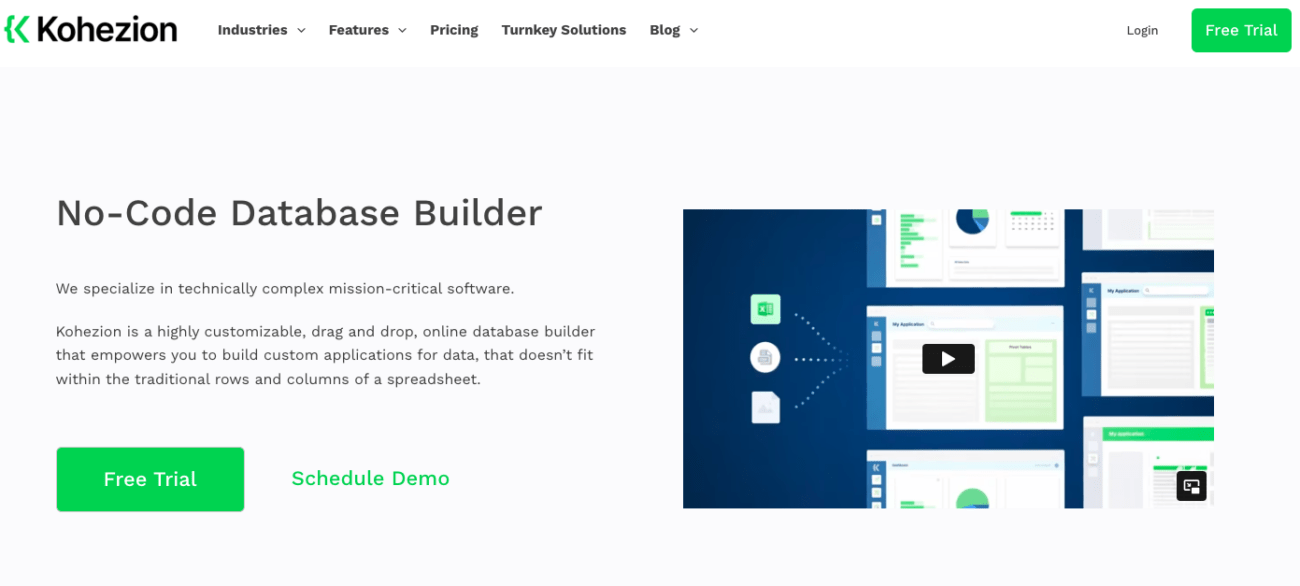
Kohezion is a versatile and user-friendly insurance policy management system designed to offer robust customization options. It centralizes policy data and automates various processes, enabling insurance companies to streamline operations. Kohezion's intuitive interface and powerful features make it an ideal choice for businesses of all sizes.
Top 5 Features:
- Customizable interface for tailored workflows
- Centralized policy data management
- Automated reminders and notifications
- Secure cloud-based storage
- Integrated reporting tools for data analysis
5 Benefits:
- Improved Flexibility - Adapts to your business needs with customizable workflows.
- Improved Data Access - Provides real-time access to centralized policy data.
- Increased Efficiency - Reduces manual tasks with automation.
- Better Decision-Making - Offers insightful reports for strategic planning.
- Scalability - Grows with your business needs without major adjustments.
2 Cons:
- Learning Curve - May require time to fully utilize customization features.
- Limited Pre-Built Templates - Customization may be necessary for specific industries.
Best For:
Large insurance companies seeking a customizable and scalable policy management solution.
2. Instanda
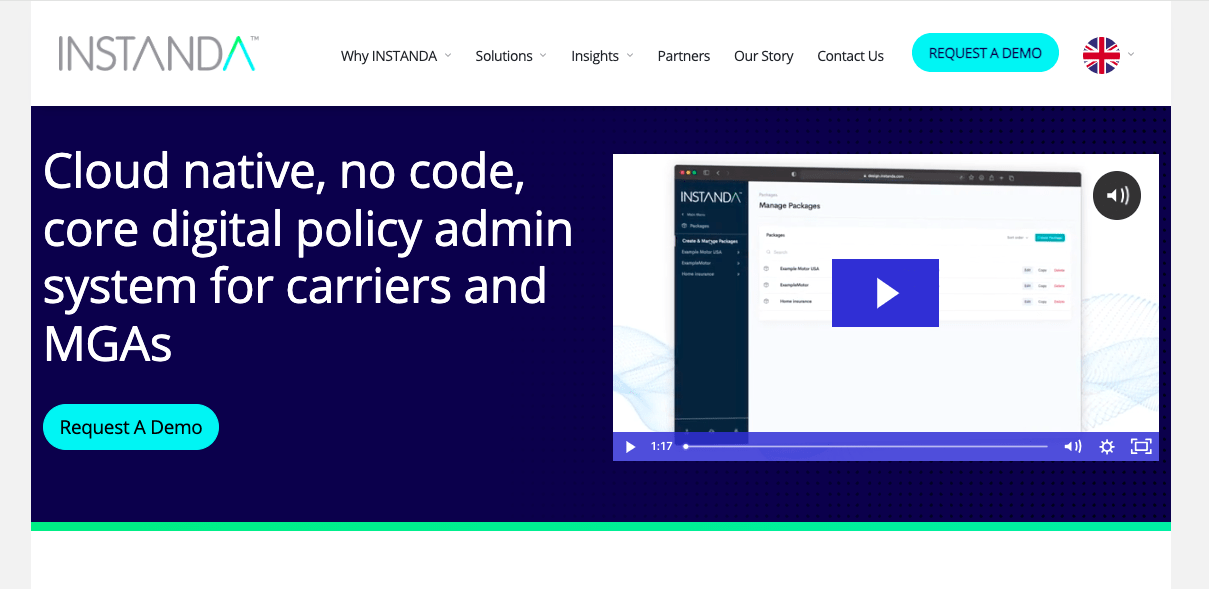
Instanda is a cloud-based insurance policy management system known for its agility and flexibility. It allows insurers to create, manage, and modify insurance products without needing extensive coding skills. Instanda supports quick product launches, making it a favorite among insurers looking to stay competitive.
Top 5 Features:
- No-code product configuration for rapid deployment
- Real-time policy updates
- API integrations for seamless connectivity
- Multi-channel distribution support
- Comprehensive analytics and reporting
5 Benefits:
- Faster Time-to-Market - Quickly launch new products without coding.
- Cost-Effective - Reduces IT dependency and associated costs.
- Improved Flexibility - Easily adjust products to meet market demands.
- Better Customer Reach - Supports multi-channel distribution for broader exposure.
- Informed Decisions - Access to detailed analytics for better insights.
2 Cons:
- Complexity - May be overwhelming for smaller teams without technical support.
- Customization Limits - While no-code, complex customizations may still require developer input.
Best For:
Insurers looking for a flexible, no-code solution to quickly launch and manage insurance products.
3. BriteCore

BriteCore is a modern, cloud-based insurance platform designed to improve the management of policies, claims, and billing. It offers a comprehensive suite of tools that cater to various insurance needs, ensuring efficient operations and improved customer satisfaction.
Top 5 Features:
- End-to-end policy management
- Integrated claims processing
- Automated billing system
- Cloud-native architecture for scalability
- Customizable user roles and permissions
5 Benefits:
- Streamlined Operations - End-to-end management simplifies workflows.
- Improved Customer Satisfaction - Quick and accurate claims processing.
- Reduced IT Costs - Cloud-native design lowers infrastructure expenses.
- Improved Data Security - Robust security measures protect sensitive information.
- Flexible Access - Accessible from any device, anytime.
2 Cons:
- Higher Costs - May be more expensive for small businesses.
- Complex Integration - Integrating with legacy systems can be challenging.
Best For:
Mid-sized to large insurance companies looking for a comprehensive, cloud-based solution.
4. Vlocity Insurance
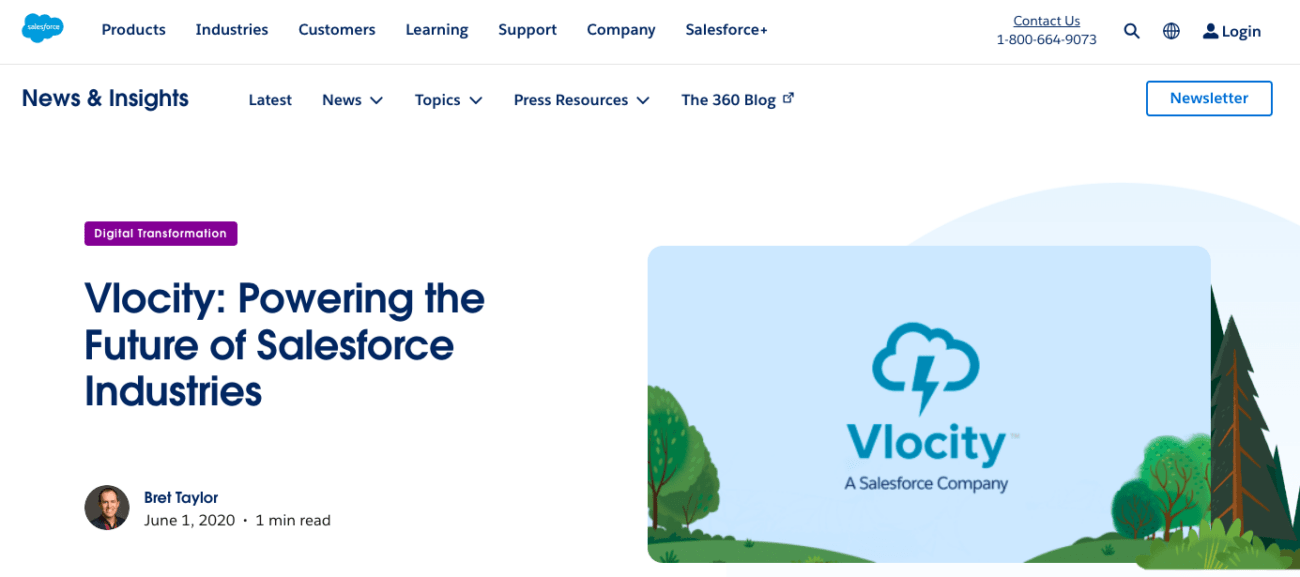
Vlocity Insurance, now part of Salesforce Industries, offers a powerful policy management system designed to meet the needs of modern insurers. It provides seamless integration with Salesforce, enabling a unified customer experience and efficient product management.
Top 5 Features:
- Salesforce integration for unified CRM and policy management
- Omnichannel customer engagement
- Automated policy renewals and updates
- Real-time data analytics and insights
- Flexible product configuration
5 Benefits:
- Unified Customer View - Seamless integration with Salesforce CRM.
- Improved Customer Experience - Consistent service across all channels.
- Reduced Manual Work - Automation streamlines policy renewals.
- Better Decision-Making - Real-time insights improve strategy.
- Adaptable System - Easily configure products to market changes.
2 Cons:
- Salesforce Dependency - Best suited for companies already using Salesforce.
- Costly for Smaller Firms - Pricing may be prohibitive for small businesses.
Best For:
Insurance companies already using Salesforce looking to improve policy management with deep CRM integration.
5. Ventiv Technology

Ventiv Technology offers a comprehensive insurance policy management system tailored to the unique needs of insurers. It provides robust features for managing policies, underwriting, and compliance, ensuring efficient and accurate operations.
Top 5 Features:
- Integrated policy and underwriting management
- Automated compliance tracking
- Customizable workflows and templates
- Real-time reporting and dashboards
- Multi-language and multi-currency support
5 Benefits:
- Streamlined Compliance - Automated tracking ensures adherence to regulations.
- Improved Accuracy - Customizable workflows reduce errors.
- Improved Global Reach - Supports multiple languages and currencies.
- Better Insights - Real-time reporting for informed decision-making.
- Operational Efficiency - Integrated management simplifies processes.
2 Cons:
- Complex Setup - Initial configuration may be time-consuming.
- Limited Third-Party Integrations - Fewer options for integrating external tools.
Best For:
Global insurance companies needing a comprehensive system with strong compliance features.
6. Majesco
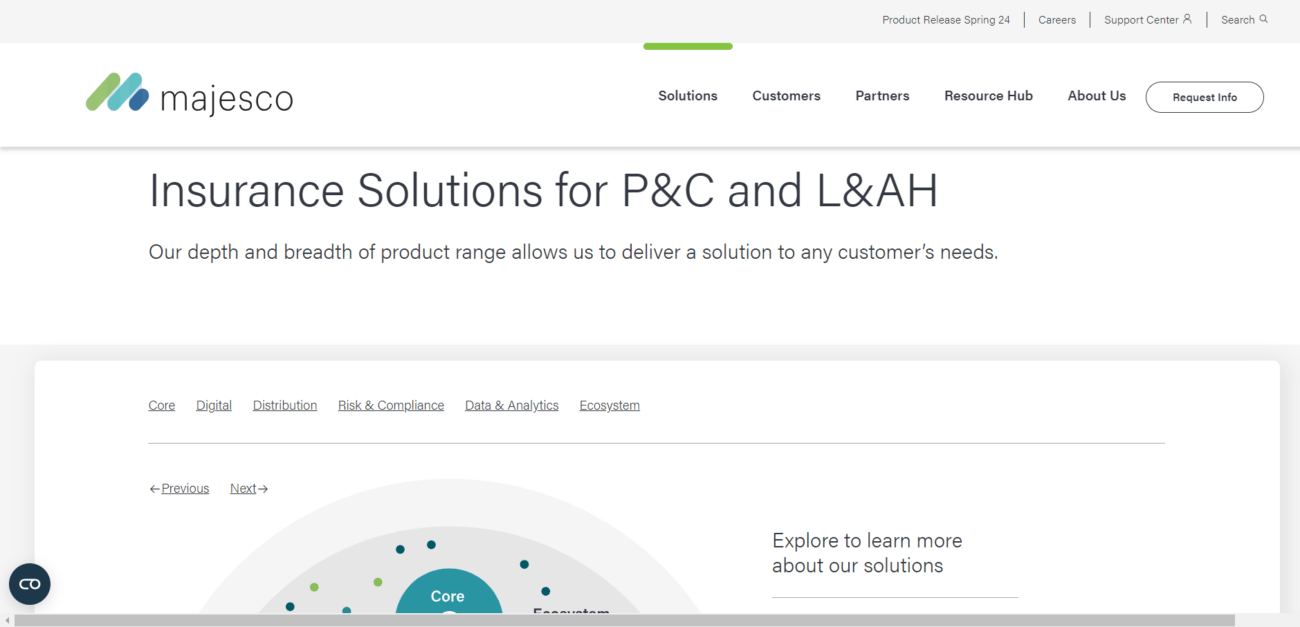
Majesco is an innovative insurance policy management system known for its flexibility and scalability. It is designed to support a wide range of insurance products, providing tools that allow for rapid product development and deployment.
Top 5 Features:
- Rapid product development tools
- Scalable cloud-based architecture
- Flexible policy administration
- Automated underwriting and claims
- Customizable user interfaces
5 Benefits:
- Faster Product Launches - Quickly develop and deploy new insurance products.
- Scalable Solution - Grows with your business needs.
- Increased Flexibility - Tailor administration to specific requirements.
- Improved Efficiency - Automation reduces manual workload.
- User-Friendly Interface - Customizable UI improves user experience.
2 Cons:
- Higher Learning Curve - May require training to maximize benefits.
- Limited Pre-Built Integrations - Some integrations may need custom development.
Best For:
Insurance companies seeking a flexible and scalable solution for rapid product development.
7. BindExpress Suite
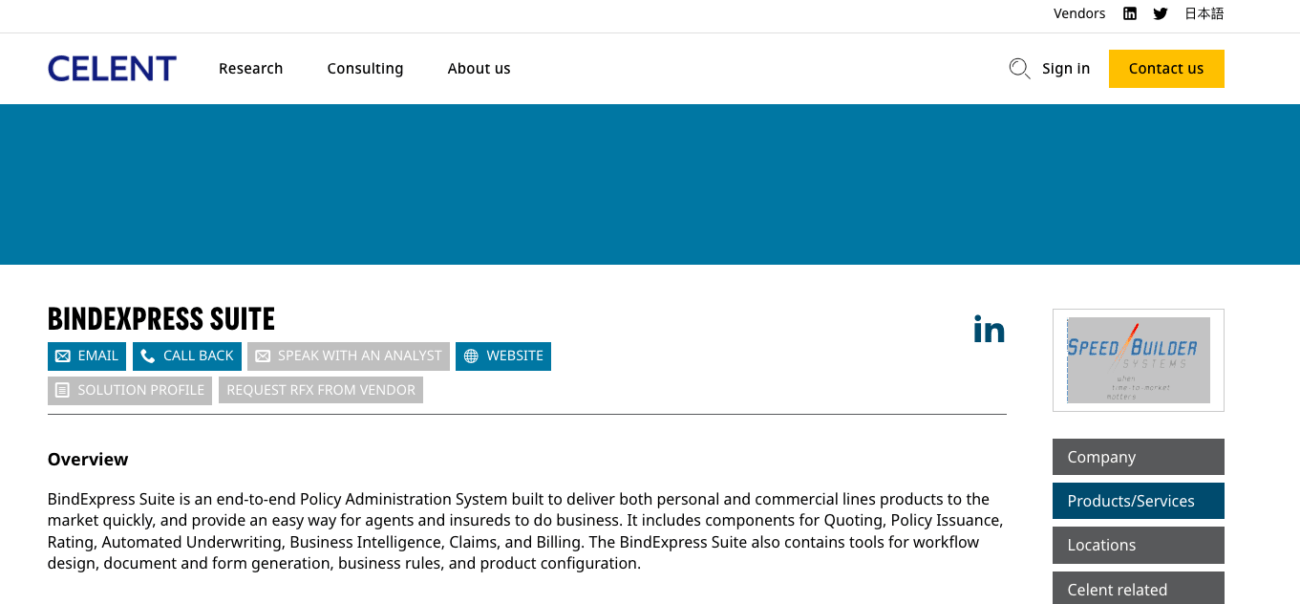
BindExpress Suite is a comprehensive policy management platform designed to streamline insurance processes from quoting to claims management. It offers powerful tools for managing the entire policy lifecycle, ensuring efficient operations and high customer satisfaction.
Top 5 Features:
- End-to-end policy lifecycle management
- Integrated claims processing
- Automated underwriting
- Customizable workflows
- Real-time reporting and analytics
5 Benefits:
- Complete Lifecycle Management - Manages policies from quote to renewal.
- Improved Efficiency - Automation streamlines underwriting and claims.
- Improved Accuracy - Customizable workflows reduce errors.
- Better Decision-Making - Access to real-time data and insights.
- Scalable Solution - Adapts to your business as it grows.
2 Cons:
- Higher Costs - Comprehensive features may come with a higher price tag.
- Complex Setup - Initial implementation may be time-intensive.
Best For:
Mid-sized to large insurance companies looking for a full-featured policy management platform.
8. iPipelne PAS+
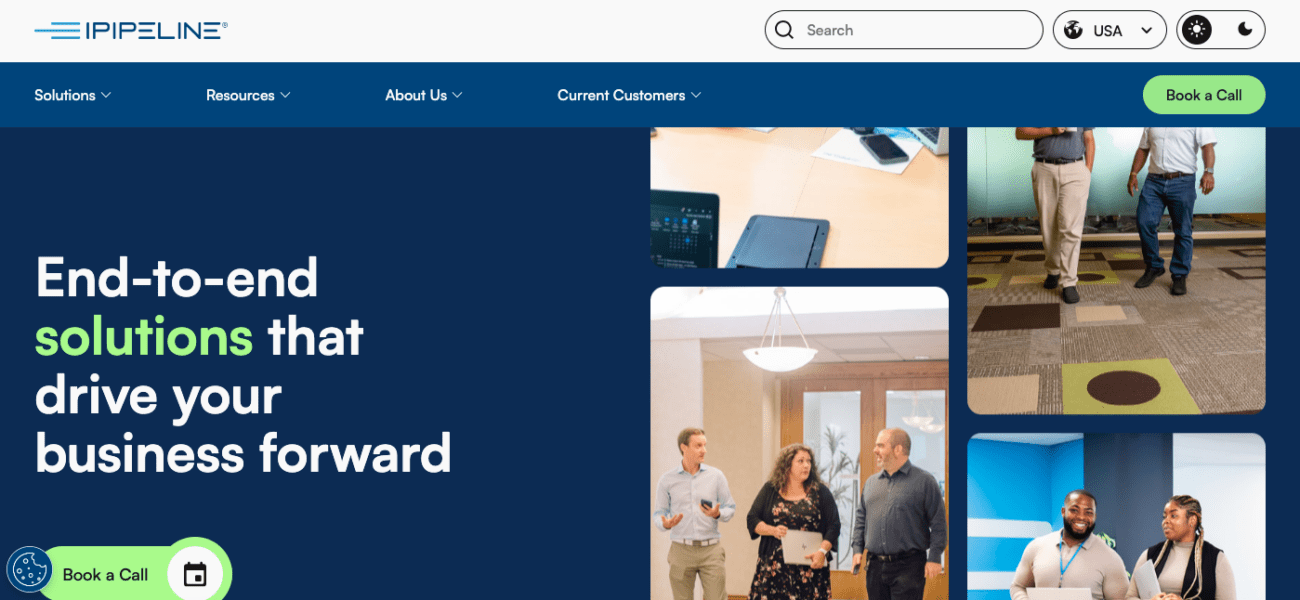
iPipelne PAS+ is an advanced insurance policy management system that focuses on delivering robust digital transformation capabilities. It enables insurers to manage policies, claims, and customer interactions through a unified platform, supporting efficient and scalable operations.
Top 5 Features:
- Digital transformation tools for policy management
- Unified customer interaction management
- Automated claims processing
- Scalable cloud-based infrastructure
- Advanced analytics and reporting
5 Benefits:
- Improved Customer Interaction - Unified platform improves customer service.
- Increased Scalability - Cloud-based infrastructure supports growth.
- Efficient Claims Processing - Automation reduces processing time.
- Better Strategic Planning - Advanced analytics provide actionable insights.
- Digital Transformation - Supports the digitalization of insurance operations.
2 Cons:
- Higher Costs - Premium features may come with a higher price.
- Complex Integration - May require significant effort to integrate with legacy systems.
Best For:
Insurance companies undergoing digital transformation seeking a unified management platform.
9. Jenesis Insurance Agency Management

Jenesis Insurance Agency Management is a user-friendly system designed to help insurance agencies efficiently manage policies, clients, and communications. It offers a range of features that streamline daily operations and improve customer satisfaction.
Top 5 Features:
- Integrated client and policy management
- Automated reminders and notifications
- Customizable reporting tools
- Multi-channel communication support
- Secure cloud-based data storage
5 Benefits:
- Improved Client Management - Centralized system improves client interactions.
- Increased Efficiency - Automation reduces manual tasks.
- Better Communication - Multi-channel support keeps clients informed.
- Improved Decision-Making - Customizable reports provide actionable insights.
- Data Security - Secure cloud storage protects sensitive information.
2 Cons:
- Limited Scalability - May not be ideal for larger agencies.
- Basic Customization Options - Customization features may be limited for advanced needs.
Best For:
Small to mid-sized insurance agencies seeking an efficient and user-friendly management system.
10. Guidewire PolicyCenter
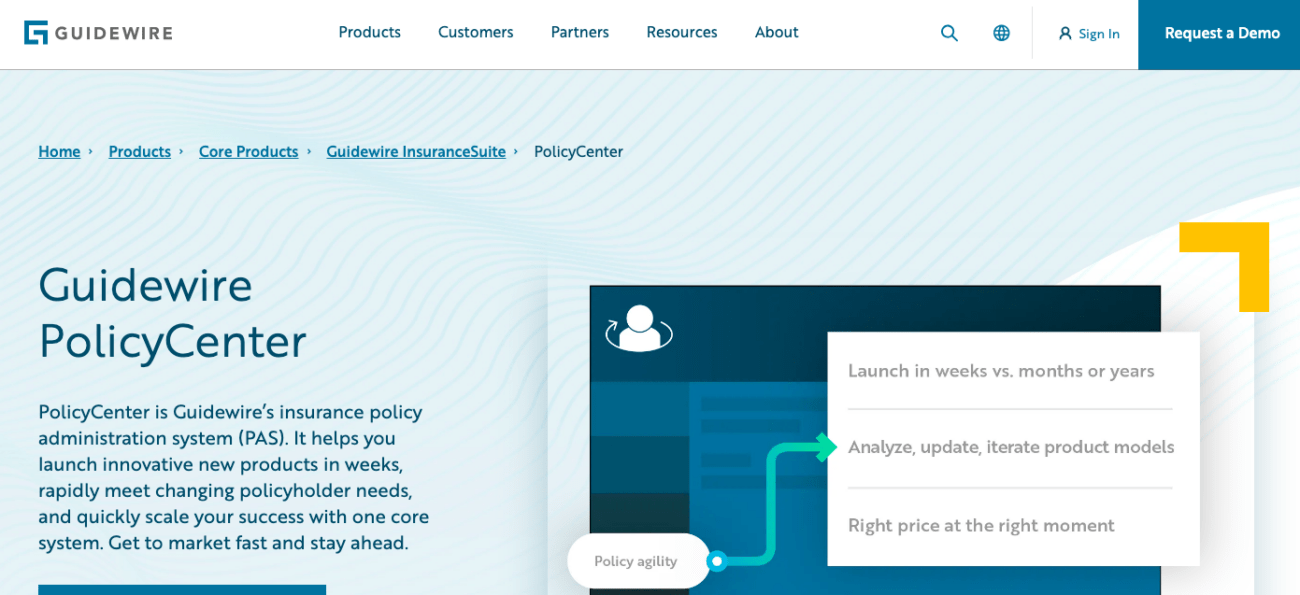
Guidewire PolicyCenter is a leading policy management solution widely adopted by insurance companies for its comprehensive features and scalability. It offers a robust platform for managing the entire policy lifecycle, from quoting to renewal, with strong integration capabilities and advanced analytics.
Top 5 Features:
- Comprehensive policy lifecycle management
- Advanced underwriting tools
- Seamless integration with other Guidewire products
- Real-time data analytics and reporting
- Configurable workflows for tailored operations
5 Benefits:
- Complete Lifecycle Management - Handles policies from inception to renewal.
- Improved Underwriting - Advanced tools support accurate risk assessment.
- Scalable Platform - Grows with your business needs.
- Informed Decision-Making - Real-time analytics provide deep insights.
- Customizable Operations - Configurable workflows adapt to business processes.
2 Cons:
- Complex Implementation - May require significant time and resources to deploy.
- Higher Costs - Advanced features may come with a higher price point.
Best For:
Large insurance companies looking for a comprehensive and scalable policy management solution with strong integration and analytics capabilities.
Top Features in an Insurance Policy Management System
When looking at an Insurance Policy Management System, look for features that help make managing insurance policies easier, more efficient, and more effective, including:
Policy and Renewal Management
Good policy and renewal management are top features. You can keep track of policy statuses and get reminders for renewals. This way, you'll never forget important deadlines.
Claims Processing
Fast and efficient claims processing is key. It helps you handle claims better and more quickly, which leads to happier customers and less work for you.
System Customization
Being able to customize the software is a big plus. It lets you adjust the system to fit your specific needs. This flexibility makes the platform more user-friendly for everyone.
Client Support
Strong client support means you can get help when you need it, which makes things run smoother and improves the experience for you and your clients.
Quote Generation
Being able to generate quotes quickly is a big deal. It allows you to respond quickly to potential clients, which can help you seize more opportunities.
Data Management
Good data management keeps important information organized and easy to find, leading to better insights and decisions.
System Integrations
Working well with other systems makes things more efficient. Being able to connect with other software keeps your operations running smoothly. It helps you stay flexible and meet changing business needs.
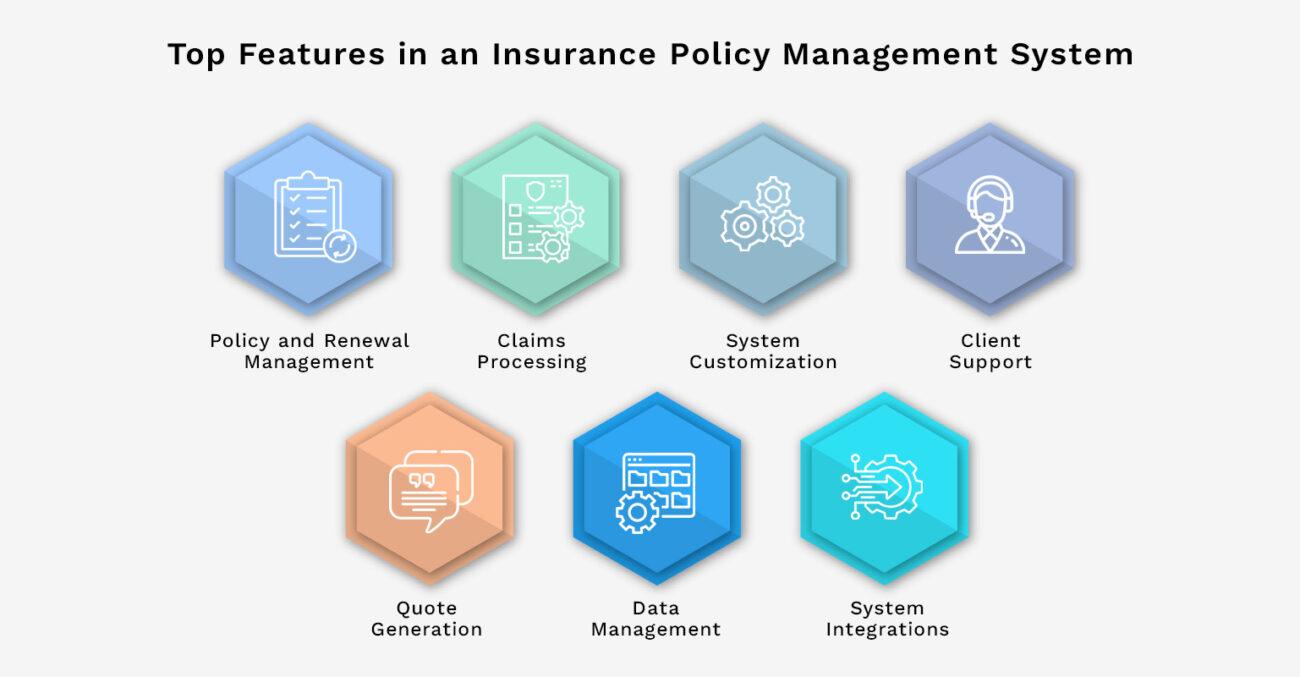
Insurance Policy Management System Pricing
The cost of insurance policy management software varies widely. The price depends on what features you need, how much the system can grow, and how customized it should be. Knowing the different IPMS pricing models helps you choose wisely.
The cost depends on your company's size and the complexity of your current systems. Comparing prices from different companies will help you find the best deal for your needs. Remember to also consider ongoing costs like maintenance and support.
Ready for Custom Insurance Policy Management System Development with Kohezion?
Are you ready to take your insurance operations to the next level? Kohezion is here to help with custom insurance development. We offer solutions made just for your business needs. Kohezion aims to improve your operations and improve customer experiences.
Kohezion's Insurance Policy Management Systems are designed to do just that. They keep you in line with laws and market trends while making things more efficient. This means you can stay ahead and meet your clients' needs.
See how working with Kohezion can improve your insurance policy management. Start moving towards innovation and excellence now.
Conclusion
Insurance Policy Management Systems increase efficiency, help with customer support, and cut costs. IPMS offers better data security, customizable reports, and faster claims processing, making your operations smoother. With high customer demands, an IPMS helps you meet their needs and follow the law.
Adopting new tech is a must looking ahead. The right IPMS changes how your business works, making it more efficient and quick to respond to customers. Focusing on these solutions will lead to success and stability for your company.
For more information on how Kohezion can help you implement the right Insurance Policy Management System, contact us today.
Start building with a free account
Frequently Asked Questions
Data migration can be challenging, but many insurance policy management systems offer tools and support to simplify the process. Plan the migration carefully, ensuring all data is clean and compatible with the new system. Working closely with the vendor can help minimize disruptions and ensure a smooth transition.
Yes, small insurance agencies can greatly benefit from using a policy management system. These systems help automate processes, reduce manual work, and improve accuracy, which is especially valuable for smaller teams with limited resources. Many systems also offer scalable options that grow with your business.
Support varies by vendor, but most offer services, including onboarding, training, and ongoing technical assistance. Some vendors provide 24/7 support, while others may have specific hours. Review the support options and service level agreements (SLAs) the vendor offers to ensure they meet your needs.


